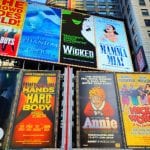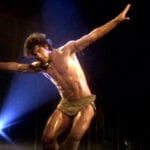 Movies and TV
Movies and TV  Movies and TV
Movies and TV  History
History 10 Dirty Government Secrets Revealed by Declassified Files
 Weird Stuff
Weird Stuff 10 Wacky Conspiracy Theories You Will Need to Sit Down For
 Movies and TV
Movies and TV 10 Weird Ways That TV Shows Were Censored
 Our World
Our World 10 Places with Geological Features That Shouldn’t Exist
 Crime
Crime 10 Dark Details of the “Bodies in the Barrels” Murders
 Animals
Animals The Animal Kingdom’s 10 Greatest Dance Moves
 Movies and TV
Movies and TV 10 Box Office Bombs That We Should Have Predicted in 2025
 History
History 10 Extreme Laws That Tried to Engineer Society
 History
History 10 “Modern” Problems with Surprising Historical Analogs
 Movies and TV
Movies and TV 10 Movie Adaptations That Ruined Everything for Some Fans
 History
History 10 Dirty Government Secrets Revealed by Declassified Files
 Weird Stuff
Weird Stuff 10 Wacky Conspiracy Theories You Will Need to Sit Down For
Who's Behind Listverse?

Jamie Frater
Head Editor
Jamie founded Listverse due to an insatiable desire to share fascinating, obscure, and bizarre facts. He has been a guest speaker on numerous national radio and television stations and is a five time published author.
More About Us Movies and TV
Movies and TV 10 Weird Ways That TV Shows Were Censored
 Our World
Our World 10 Places with Geological Features That Shouldn’t Exist
 Crime
Crime 10 Dark Details of the “Bodies in the Barrels” Murders
 Animals
Animals The Animal Kingdom’s 10 Greatest Dance Moves
 Movies and TV
Movies and TV 10 Box Office Bombs That We Should Have Predicted in 2025
 History
History 10 Extreme Laws That Tried to Engineer Society
 History
History 10 “Modern” Problems with Surprising Historical Analogs
Top 10 Simpsons Broadway Parody Songs
The Simpsons is known for its well-educated writers and witty hidden references: No matter how small the demographic, its almost guaranteed there’s a Simpsons moment dedicated to it.
The show is also famous for including musical numbers in many episodes. Some of these only last a few seconds, such as a riddle or schoolyard rhyme. But some of them are references to shows and songs that generations have loved from the Great White Way. Here are some of the best ones you can tap your toe to.
Related: 10 Surprising Musical Moments From Popular Shows
10 Adequate
Groundskeeper Willie is one of the least refined characters on The Simpsons (and that’s saying something). His coarse Scottish accent and classic blue jean overalls make him the perfect subject for this 2006 episode based on My Fair Lady, appropriately retitled “My Fair Laddy.”
Lisa plays the role of Henry Higgins, convincing The Simpsons version of Eliza Doolittle (Willie) that his life could be better. Instead of singing how “loverly” it might be, as in the original, Lisa entices Willie into believing his life as a higher-class man could be “adequate.”
The parody here lives up to the name. [1]
9 A Chorus Line
If you can’t tell from the title, not much work went into this one. The finale of A Chorus Line (the musical) famously features the entire company in sparkling gold costumes, kicking their legs to the sky.
The opening lyrics of The Simpson’s version are literally: “One… chorus line of people.” The comedy is more in the cartoon itself, which features the cast dancing without any skin—they’ve been turned inside out. Did I forget to mention this was a Halloween episode?[2]
8 Tune Knight
West Side Story took the world by storm when it premiered in 1957: The same cannot be said for this 2015 episode of The Simpsons.
As Homer and his friends prepare for poker night (and Lisa for band camp), the quartet breaks into overlapping verses of song to the tune of “Tonight (Quintet)” by Leonard Bernstein.
The lyrics here aren’t particularly clever or gripping (though to be fair, that does fit the characters.) The only word that necessarily rhymed with anything is “tonight,” making for a fun but low-brow minute and a half.
Despite this, the song does do an effective job of letting watchers know the plot of the episode up until this point. What more do you need than every single character stating what they’re literally intending to do at the end of the song?[3]
7 Another Springfield Day
Moving away from the classic tune of Leonard Bernstein, “Another Springfield Day” opens the same way that La La Land does: traffic.
In the 2016 movie musical, the drivers made do with the congestion by getting out of the car to sing and dance. Even though there are things about Los Angeles that they hate, they know they’ll always wake up to “another day of sun.”
The iconic “bum-da-dum” notes of La La Land’s opening song gives The Simpsons viewers the expectation that the song will be a love ballad to their town despite its issues. But of course, it wouldn’t be much of a comedy if it didn’t subvert our expectations.
Springfield is lauded as a “truly perfect place to see your dreams just fade away” and a “town that drags you down.”[4]
6 Today Garage Sale
If you think you’re having déjà vu, you’re not. Six years after the “Tune Knight” song premiered on a season 27 episode, they parodied the same song from the same musical. At least this one has a different title.
As the title suggests, the song is sung by patrons of a garage sale being thrown by Simpson’s neighbor Ned Flanders. While the original song starts off with “Anita’s gonna get her kicks tonight,” character Helen Lovejoy begins, “This woman’s gonna get what she wants today” while scouring the yard.
The refrain of “today” mirrors the original song’s emphasis on the importance of “tonight.” In West Side Story, the song is a powerful tapestry of each character’s needs, with the Sharks and Jets singing about the upcoming violent confrontation between the two gangs and Anita’s eagerness to see her boyfriend after the rumble.
In The Simpsons, it’s about fuzzy dice.[5]
5 Springfield, Springfield
When Milhouse and Bart overdose on syrup from the Kwik-E-Mart, Milhouse declares they should “go crazy, Broadway style!”
And that they do. The duo sings their praises of “Springfield, Springfield,” a parody of “New York, New York.” Instead of “the Bronx is up and the Battery’s down,” the lyrics are adjusted to account for Springfield’s geography. “The schoolyard’s up, and the shopping mall’s down!”
The original song is sung by three sailors in the classic musical On the Town. As a nod to this, a sailor interrupts Milhouse and Bart to croon about NYC until Bart tells him, “New York’s that way, man!”
The rest of the song follows the boys as they galavant through town, taking advantage of the opportunities their hometown affords them.[6]
4 The Genius of Monty Burns
This one is for the true Broadway fans.
Everyone knows Monty Burns as the conspiratorially evil boss of the Springfield Nuclear Power Plant. He has seemingly unlimited wealth, which he almost always uses for his own selfish ways. He doesn’t care about his employees as much as his bottom line.
Sound familiar? If you’re thinking he sounds a bit like Henry Ford… you’re probably a little weird, but you’re right! The Simpsons writers evidently thought that Burns’s tyrannical rule of Springfield’s banana republic nuclear plant was similar to Ford’s creation and invention of the Model T and factories in Detroit.
In the 1996 musical Ragtime (based on the 1975 novel of the same name), Henry Ford plays a minor role, singing through his theory of how the assembly line will take America by storm. He laughs in the face of his workers, claiming that “even people who ain’t too clever can learn to tighten a knot forever!”
To the exact same tune, Mr. Burns urges his factory workers to speed up their labor and joyously proclaims, “Even people who ain’t too clever can work for minimum wage forever.”
While certainly less well known than other musicals and references on this list, “The Genius of Monty Burns” gets extra points for obscurity and cleverness.[7]
3 The Garbage Man
Who can take the sunrise and sprinkle it with dew? Cover it in chocolate and a miracle or two? The candy man, of course. But who needs candy when you can have garbage?
In this season nine episode, Homer runs for office as trash commissioner after having a fight with the local garbage men. He wins by promoting the slogan “Can’t someone else do it?” and sings about his cleanliness plans for Springfield to the tune of “The Candyman” from Willy Wonka and the Chocolate Factory. Oscar the Grouch even makes a cameo appearance.
This episode, in general, was well-received, even winning an Emmy in 1998. It was the 200th episode of the long-running series. It was chosen specially by showrunner Mike Scully as such because he believed “it had all the elements of what The Simpsons does best: corporate satire, political satire, a production number, a great story with Homer, and the family is involved.”[8]
2 See My Vest
This one is a mix of two iconic Disney films: Beauty and the Beast and One Hundred and One Dalmatians.
The plot of the episode “Two Dozen and One Greyhounds” (as the title suggests) parallels that of the latter. The evil Mr. Burns adopts 25 greyhound puppies, intending to kill 24 of them to make himself a Cruella-style tuxedo.
Because 101 Dalmatians isn’t a musical, the writers decided to parody arguably one of the most famous Disney songs of all time, “Be Our Guest,” from Beauty and the Beast.
Mr. Burns belts “See My Vest,” bragging about his macabre wardrobe made of animals. With lyrics such as “Like my loafers? Former gophers—it was that or skin my chauffeurs!” it’s easy to see why this has been hailed as one of the most iconic songs in the series.[9]
1 Monorail
Almost undoubtedly, the best of the best comes from season four’s “Marge vs. the Monorail.” Written by Conan O’Brien and featuring Phil Hartman and Leonard Nimoy, this episode follows the people of Springfield as they’re convinced by fast-talking salesman Lyle Lanley to build a town monorail.
To convince the town that a monorail is just what they need, Lanley breaks into song. What ensures is a direct parody of “Ya Got Trouble” from the 1957 musical The Music Man. Lanley mirrors the star of the show, Harold Hill, who similarly convinces the townspeople of the fictional River City that a pool table has been the source of all their troubles. Once they get rid of the pool table, he claims, everything will be better.
Both “Ya Got Trouble” and “Monorail” utilize snappy call-and-response lines in their lyrics. While Hill repeats his mantra of “We’ve got trouble,” Lanley sings “Monorail!” until Springfield is ready to fund his little project, which turns out to be a huge mess, just like conman Hill’s plan to steal money from River City and then bounce.
The song has been hailed as one of the best and quintessential moments of the long-running TV show, with the “pure, dumb joy” of the tune both being hilarious and commenting on corruption in political infrastructure.[10]








